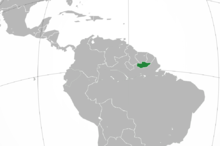San Theodoros
| San Theodoros | |
|---|---|

Flag
|
|

Approximate location of San Theodoros
|
|
| The Adventures of Tintin location | |
| Other name(s) | Republic of San Theodoros |
| Created by | Hergé |
| Genre | Comic strip |
| Type |
Banana republic (1942-1976, 1976-) Military dictatorship (1976) |
| Ethnic group(s) | Spanish, Spanish mestizo, Bibaro, Arumbajo (or Arumbaya) |
| Notable locations | Los Dopicos/Las Dopicos (formerly Tapiocopolis, c. 1946 and nicknamed Alcazaropolis, c. 1976) (capital) |
| Language(s) | Spanish; possibly Creole |
San Theodoros is a fictional country in The Adventures of Tintin, the comics series by Belgian cartoonist Hergé. It is a banana republic under the yoke of military government located in Latin America. San Theodoros is depicted in The Broken Ear and Tintin and the Picaros, and is referred to in The Seven Crystal Balls and The Red Sea Sharks.
The Spanish invaders founded the city of "Our Lady of Las Dopicos" in 1539, which was actually near Tenuzco, the capital of the Pazteca empire. In the series, the capital had two spelling variations: Los Dopicos and Las Dopicos. (The former spelling is more likely to be the correct one; the latter would require dopico being a feminine noun.)
San Theodoros apparently became independent around the early 1830s as a result of the unstated actions of General José Olivaro, possibly similar to those of Simón Bolívar or José de San Martín. Endless rebellions after Olivaro in the 1840s until 1930s made San Theodoros have the most number of presidents in history.
During the The Broken Ear, San Theodoros and its hostile neighbor Nuevo Rico go to war over the area of Gran Chapo (grand chapeau, "Big Hat") in 1937—an allusion to the Chaco War fought by Bolivia and Paraguay over Gran Chaco from 1932–1935. It was thought that the area was custodian of large oil reserves, so a war sparked in the area. The Chapo War, whose start was accidentally precipitated by Colonel Tintin, was short, lasting only a few weeks at most, resulting in a stalemate. It is eventually revealed that the notion of the presence of oil in the area was incorrect (again, as with the real Chaco War).
...
Wikipedia
